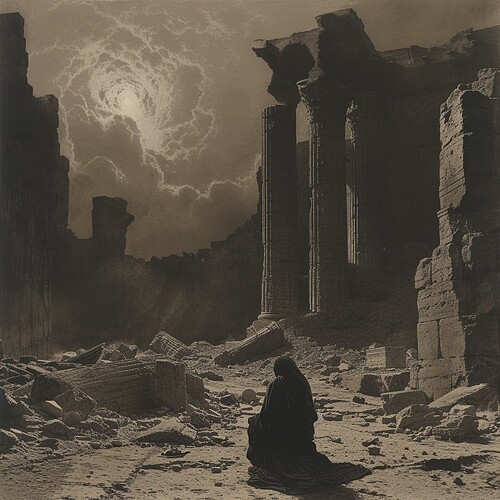![]() February 11: Psalm 74 - Standing Firm Amidst Destruction and Desolation
February 11: Psalm 74 - Standing Firm Amidst Destruction and Desolation
![]() Introduction: Psalm 74, a Maskil of Asaph, leads us through a wave of despair, anguish, reflection, and eventually hope. Asaph cries out to God over the destruction of the sanctuary by invaders, probing us to ratify our faith amidst adversity.
Introduction: Psalm 74, a Maskil of Asaph, leads us through a wave of despair, anguish, reflection, and eventually hope. Asaph cries out to God over the destruction of the sanctuary by invaders, probing us to ratify our faith amidst adversity.
![]() Desecration of the Sanctuary: As the Psalmist recounts the havoc wreaked upon the temple, his despair echoes through the ages.
Desecration of the Sanctuary: As the Psalmist recounts the havoc wreaked upon the temple, his despair echoes through the ages. ![]() Key Verse: Psalm 74:3 “Turn your steps toward these everlasting ruins, all this destruction the enemy has brought on the sanctuary.”
Key Verse: Psalm 74:3 “Turn your steps toward these everlasting ruins, all this destruction the enemy has brought on the sanctuary.”
![]() Reflection on Nature and Creation: Asaph appeals to God’s creative powers, acknowledging God as the ultimate creator and sustainer of the universe.
Reflection on Nature and Creation: Asaph appeals to God’s creative powers, acknowledging God as the ultimate creator and sustainer of the universe. ![]() Key Verse: Psalm 74:16-17 “Yours is the day, yours also the night…you have established all the boundaries of the earth; you have made summer and winter.”
Key Verse: Psalm 74:16-17 “Yours is the day, yours also the night…you have established all the boundaries of the earth; you have made summer and winter.”
![]() Key Themes and Reflections:
Key Themes and Reflections:
- The Reality of Desolation - Psalm 74 shows us a picture of utter desolation, reminding us that life’s journey is not always smooth sailing. Hence, we should be prepared to face adversities with faith.
- God as the Creator and Sustainer - The Psalmist skillfully shifts his perspective from the devastation towards God’s sovereignty over all creation. It reminds us that God, having control over all things, is our only source of hope in times of difficulty.
![]() Today’s Application: Psalm 74 urges us to hold onto our faith in times of crisis. Despite the chaos and destruction, we should remember that God is in control and He remains our steadfast anchor.
Today’s Application: Psalm 74 urges us to hold onto our faith in times of crisis. Despite the chaos and destruction, we should remember that God is in control and He remains our steadfast anchor.
![]() Hidden Gem: Notice the slight shift in Asaph’s tone from questioning God to praising Him for His creative power. It teaches us the importance of perspective-shift in dealing with life’s situations.
Hidden Gem: Notice the slight shift in Asaph’s tone from questioning God to praising Him for His creative power. It teaches us the importance of perspective-shift in dealing with life’s situations.
![]() Reflective Q&A:
Reflective Q&A:
![]() Why is it important to recall God’s creation in times of suffering?
Why is it important to recall God’s creation in times of suffering?
A: Recalling God’s creation allows us to remember His sovereignty and reassures us of His control over all things, especially when our circumstances seem beyond control.
![]() How can we find hope amid destruction and devastation?
How can we find hope amid destruction and devastation?
A: We find hope in God’s character. He is the Creator & Sustainer of all things. Though situations might be bleak, our faith in Him brings hope and strength.
![]() Join the Discussion: Share your thoughts on finding hope amidst adversity and how Psalm 74 resonates with your life journey.
Join the Discussion: Share your thoughts on finding hope amidst adversity and how Psalm 74 resonates with your life journey.
